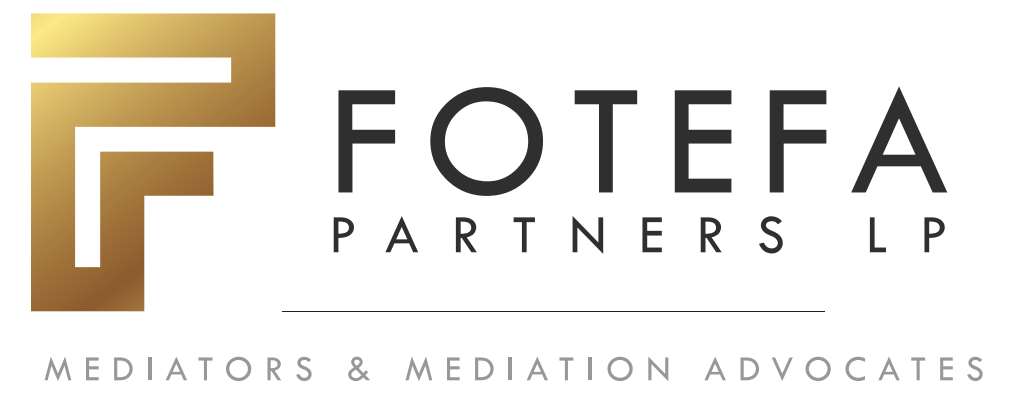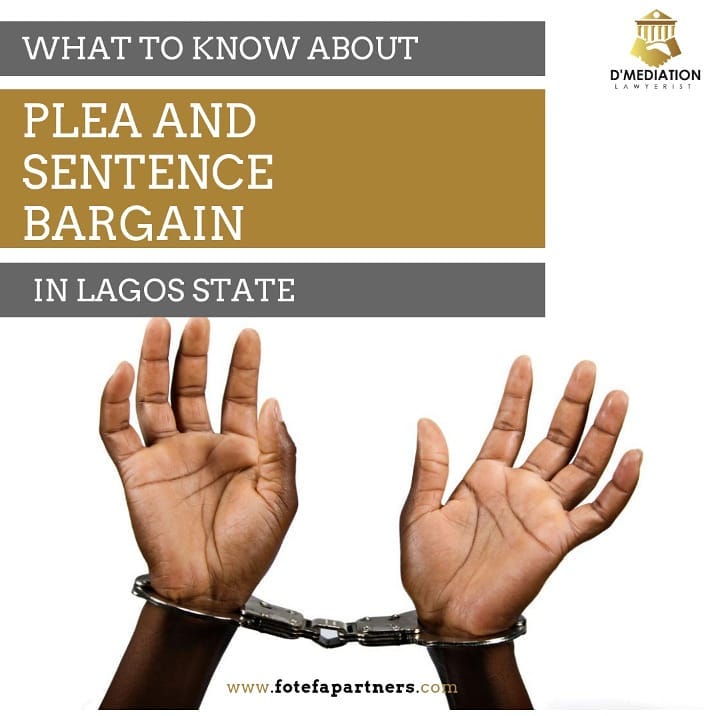Q: WHAT IS PLEA BARGAIN?
ANS: This is the negotiation of an agreement between the prosecution and the defense whereby the Defendant is permitted to plead guilty to a reduced charge in exchange for a more lenient sentence or an agreement to drop other charges against the Defendant.
Q: IS PLEA BARGAINING LEGAL?
Ans: Yes.
- Sections 75 and 76 of the Administration of Criminal Justice Law of Lagos State [ACJL], 2015 make provision for Plea Bargaining.
Q: ARE THERE ANY ADVANTAGES OF PLEA BARGAIN TO THE DEFENDANT?
Ans: Yes.
- The major benefit to Defendants is the certainty of receiving a less severe charge for a lighter sentence unlike what might have resulted from a conviction after full trial.
- Saves time and expenses of lengthy trial. Defendants who engage private counsel rather than counsel from Legal Aid, Office of the Public Defender or any other Non-Governmental Organization, would definitely save money on legal fees.
- Saves risk of harsher punishment and the unnecessary publicity it could generate.
- Reduces time spent in custody awaiting trial. For Defendants in custody who were denied bail or who cannot perfect their bail, a plea bargain could guarantee a quicker release from custody than a full trial.
- Removes uncertainty of sentencing and gives a higher chance of a lighter sentence.
- Where there is overwhelming evidence that the Defendant is culpable and would most likely be convicted, a plea bargain is a better and more advisable option.
Q: WHO APPROVES PLEA BARGAIN?
ANS: The Honorable Attorney-General of Lagos State approves plea bargain applications from Defendants charged with State Offences.
Q: ARE PLEA BARGAINS AVAILABLE TO EVERY DEFENDANT?
ANS: Yes.
- Any Defendant can apply for a Plea Bargain. Section 75 of the Administration of Criminal Justice Law of Lagos State, 2015 provides as follows:
“Notwithstanding anything in this Law or in any other law, the Attorney-General of the State shall have power to consider and accept a plea bargain from a person charged with any offence where the Attorney-General is of the view that the acceptance of such plea bargain is in the public interest, the interest of justice and the need to prevent abuse of legal process”.
Every offense is amenable to Plea Bargains but each case would be considered based on its peculiar facts in accordance with Plea Bargain Guidelines.
Q: WHY SHOULD A DEFENDANT ACCEPT A PLEA BARGAIN?
ANS: In considering whether to accept a Plea Bargain or not, a Defendant may consider several issues especially his chances of successfully defending the case against him during the trial. Where such chances are slim, a plea bargain will be beneficial to the Defendant. A DEFENDANT MUST MAKE SURE HE SEEKS PROPER GUIDANCE FROM HIS COUNSEL BEFORE ACCEPTING A PLEA BARGAIN.
Q: HOW DOES THE ATTORNEY-GENERAL DECIDE?
ANS: In Lagos State, the Honourable Attorney-General makes his decisions based on recommendations from the Plea-Bargain Committee, a committee set up in the Directorate of Public Prosecutions for the purpose of considering cases referred for Plea Bargain.
Q: ARE THERE ANY ADVANTAGES TO THE PROSECUTION?
ANS: Yes.
- It saves time and resources while also reducing the trauma to the victims.
- It aids Prison decongestion.
- It helps case management.
- It reduces the number of inmates awaiting trial.
Q: ARE THERE ANY ADVANTAGES TO THE JUDICIARY?
ANS: Yes.
- The major advantage to the Judiciary is that it helps to conserve the limited resources of the Judiciary by reducing the number of Criminal Cases for trial.
- Reduces the burden of the court in conducting a trial on every case charged.
Q: IS THE VICTIM ALLOWED TO PARTICIPATE IN THE PROCESS?
ANS: Yes.
- Section 76[2][a] of the Administration of Criminal Justice Law of Lagos State provides as follows:
“The Prosecutor may only enter into an agreement contemplated in subsection [1] of this section-
[a] after consultation with the Police Officer responsible for the investigation of the case and a reasonable feasible, the victim and
[b] with due regard to the nature of and circumstances relating to the offense, the Defendant and the interest of the community.
- Section 76[3] of the Law also provides that the Prosecutor shall allow the Complainant to make representations regarding the content of the agreement and a compensation or restitution order.
- The victim and society are given full consideration.
Q: ARE THERE FACTORS WHICH ACT AS GUIDELINES IN MAKING PLEA-BARGAIN APPLICATIONS?
ANS: Yes.
The Plea Bargain Committee considers each Application separately based on the public interest, interest of justice and the need to prevent abuse of the legal process. Several factors are considered including the following:
- Speedy dispensation of justice,
- Long interval between the commission of the offense and the trial,
- The need to protect victims of the crime.
- Cost of prosecution and the likelihood of a protracted trial.
- Case management.
- Protracted nature of the period spent in prison custody while awaiting trial even where the chances of conviction are high.
Q: HOW DOES ONE INITIATE PLEA BARGAIN UNDER THE ADMINISTRATION OF CRIMINAL JUSTICE LAW OF LAGOS STATE?
ANS: The procedure for the approval of a plea bargain is as follows:
- The Defence in a criminal case shall submit an application for a plea bargain to the office of the Attorney-General and Commissioner for Justice or the Director of Public Prosecutions.
Q: IS THERE A GUARANTEE THAT THE DEFENDANT WOULD GET A GOOD BARGAIN?
ANS: Yes.
- Section 76[5] of the Administration of Criminal Justice Law states that the Presiding Judge or a Magistrate cannot participate in the Plea Bargain discussions, but if approached by counsel in court, may inform them [in general terms] of the possible advantages, possible sentencing options or the acceptability of a proposed agreement. The Presiding Judge or Magistrate is also empowered to confirm that due process was followed, that the Agreement was entered into voluntarily by the Defendant and to verify that the facts can support the proposed Charge before proceeding.
In addition, Sections 76[6] – 76[7] provides that the Presiding Judge or Magistrate has oversight functions on the proposed Plea Bargain Agreement and has the final say on the proposed sentence.
- Furthermore, Sections 76[9] and 76[10] of the Administration of Criminal Justice Law of Lagos State, state that where the Presiding Judge or Magistrate is of the view that the Defendant should be given a heavier sentence than is contained in the Proposed Plea Bargain, such Defendant would be informed, he can opt out and trial will proceed without prejudice to the previous Plea Bargain Discussions.
Q: DOES AN APPLICATION FOR PLEA BARGAIN REQUIRE A PROCESSING FEE?
ANS: NO.
- The Process DOES NOT require the payment of any processing fee.
Credit: *Administration of Criminal Justice Law of Lagos State [ACJL], 2015* Office of the Honourable Attorney- General and Commissioner For Justice* Ministry of Justice


